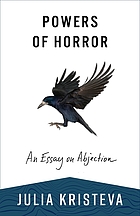
Kristevas concept selection is typically used to explain popular cultural narratives of terror and discriminatory behavior manifests itself in misogyny, homophobia, and genocide. The best representation of this concept can be represented as a reaction of looking at a human corpse, or the corpse, as a direct reminder of the inevitability of death.Įxtreme is, as such, a process that separates the environment from those that are "not me." Kristeva describes the horror as a subjective feeling when an individual experiences or is confronted with what Kristeva calls the "material reality" or breakdown in the distinction between self and what is other.Ībjection prevents absolute understanding of existence after the course of biological, social, physical and spiritual cycles. Among the most popular interpretations prinizhennost Julia Kristevas, pursued in particular in the work of 1980s power of horror: essay on abjection. The term has been explored in post-structuralism, which in essence violates the conventional identity and cultural concepts.

Kristeva's book is well developped in a Lacanian perspective but she seems to go beyond its limits, for she considers abjection, after clarifying the concept's meaning, in a comparative manner across modern literature, biblical texts and - last but not least - Céline's prose as a major psychological tendency which can be evaluated not only in individuals, but in collectivities.The term abjection literally means "the state of being cast off". Any object the subject desires will never be anything other than a substitute for the object a." "For the psychoanalysts the important object is the lost object, the object always desired and never attained, the object that causes the subject to desire in cases where he can never gain the satisfaction of possessing the object. In the Translator's Notice, on page X, we are confronted with a quote from Stuart Schneiderman ("Returning to Freud"), which expresses the well-known search of Lacanian psychoanalysts for the object a:


Such wastes drop so that I might live, until, from loss to loss, nothing remains in me and my entire body falls beyond the limit - cadere, cadaver." My body extricates itself, as being alive, from that border. There, I am at the border of my condition as a living being.

In Kristeva's words: "These body fluids, this defilement, this shit are what life withstands, hardly and with difficulty, on the part of death. "Powers of Horror" seems to be an enlighted as well as enlightening book, what concerns moments of personal nausea or in the sublimated or attenuated form: moments of the belief, that one has to reject something, which would be deeply rooted in her/his unconscious abjection here marks this borderland of repulsiveness, in which the schizophrenic process has such fertile grounds to develop.


 0 kommentar(er)
0 kommentar(er)
